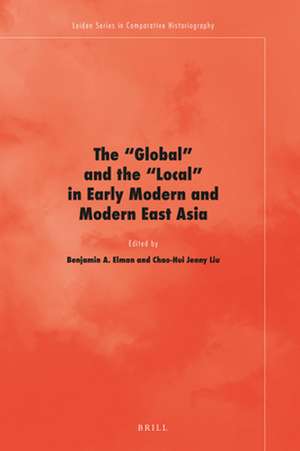The 'Global' and the 'Local' in Early Modern and Modern East Asia: Leiden Series in Comparative Historiography, cartea 10
Editat de Benjamin A. Elman, Chao-Hui Jenny Liuen Limba Engleză Hardback – 25 ian 2017
important universities in the East Asian region—The University of Tokyo (Tōdai) and Fudan University, along with East Asian Studies scholars from Princeton University. Two of the essays address the international leanings in the histories of their respective departments in Todai and Fudan. The rest of the essays showcase how such thinking about the global and local histories have borne fruit, as the scholars of the three institutions contributed essays, arguing about the philosophies, methodologies, and/or perspectives of global history and how it relates to local stories. Authors include Benjamin Elman, Haneda Masashi, and Ge Zhaoguang.
Preț: 606.50 lei
Preț vechi: 739.63 lei
-18% Nou
Puncte Express: 910
Preț estimativ în valută:
116.05€ • 121.49$ • 96.03£
116.05€ • 121.49$ • 96.03£
Carte indisponibilă temporar
Doresc să fiu notificat când acest titlu va fi disponibil:
Se trimite...
Preluare comenzi: 021 569.72.76
Specificații
ISBN-13: 9789004338111
ISBN-10: 900433811X
Pagini: 258
Dimensiuni: 155 x 235 x 20 mm
Greutate: 0.52 kg
Editura: Brill
Colecția Brill
Seria Leiden Series in Comparative Historiography
ISBN-10: 900433811X
Pagini: 258
Dimensiuni: 155 x 235 x 20 mm
Greutate: 0.52 kg
Editura: Brill
Colecția Brill
Seria Leiden Series in Comparative Historiography
Cuprins
List of Contributers
Introduction: An Overview, by Benjamin A. Elman
Part 1 Is World History Possible?
1 Is There Still Value in National History in the Trend towards Global History?, by Zhaoguang Ge
2 Is a World History of Ideas Possible?, by Federico Marcon
Part 2 What Forms of Globalization Took Shape in Traditional East Asia?
3 Conditional Universality and World History in Modern Philosophy in East Asia, by Nakajima Takahiro
4 A New Global History and Regional Histories, by Masashi Haneda
5 A Jointly Regional-Global Approach to Rethinking Early Modern East Asian History, by Benjamin A. Elman
Part 3 How Did Internationalism Emerge in Modern Chinese and Japanese Higher Education?
6 Internationalization from Within: 140 Years of Internationalization at the University of Tokyo. By Jin Satō
7 Global History in China: Inheritance and Innovation—A Case Study of the Development of World History in the History Department of Fudan University, by Yunshen Gu
Part 4 Doing ‘World’ or ‘Global’ History as ‘Transnational’ History
8 From ‘East Asia’ to ‘East Asian Maritime Worlds’: The Pros and Cons of the Construction of a Historical World, by Shaoxin Dong
9 From Sri Lanka to East Asia: A Short History of a Buddhist Scripture, by Norihisa Baba
10 ‘Nobody Changed Their Old Customs’—Tang Views on the History of the World, by Tineke D’Haeseleer
11 The Korean Response to Xue Xuan’s Enshrinement in the Ming Confucian Temples, by Xinlei Wang
12 Literature of the Sixteenth and Seventeenth Century World, by Yasushi Ōki
13 Tales of an Open World: The Fall of the Ming Dynasty as Dutch Tragedy, Chinese Rumor, and Global News, by Paize Keulemans
14 The Regulation of Sailors in the Maritime Trade between Jiangnan and Nagasaki in Early Qing China, by Zhenzhong Wang
15 The Transnational History of Japanese Thrift, by Sheldon Garon
Coda, by Benjamin A. Elman
Index
Introduction: An Overview, by Benjamin A. Elman
Part 1 Is World History Possible?
1 Is There Still Value in National History in the Trend towards Global History?, by Zhaoguang Ge
2 Is a World History of Ideas Possible?, by Federico Marcon
Part 2 What Forms of Globalization Took Shape in Traditional East Asia?
3 Conditional Universality and World History in Modern Philosophy in East Asia, by Nakajima Takahiro
4 A New Global History and Regional Histories, by Masashi Haneda
5 A Jointly Regional-Global Approach to Rethinking Early Modern East Asian History, by Benjamin A. Elman
Part 3 How Did Internationalism Emerge in Modern Chinese and Japanese Higher Education?
6 Internationalization from Within: 140 Years of Internationalization at the University of Tokyo. By Jin Satō
7 Global History in China: Inheritance and Innovation—A Case Study of the Development of World History in the History Department of Fudan University, by Yunshen Gu
Part 4 Doing ‘World’ or ‘Global’ History as ‘Transnational’ History
8 From ‘East Asia’ to ‘East Asian Maritime Worlds’: The Pros and Cons of the Construction of a Historical World, by Shaoxin Dong
9 From Sri Lanka to East Asia: A Short History of a Buddhist Scripture, by Norihisa Baba
10 ‘Nobody Changed Their Old Customs’—Tang Views on the History of the World, by Tineke D’Haeseleer
11 The Korean Response to Xue Xuan’s Enshrinement in the Ming Confucian Temples, by Xinlei Wang
12 Literature of the Sixteenth and Seventeenth Century World, by Yasushi Ōki
13 Tales of an Open World: The Fall of the Ming Dynasty as Dutch Tragedy, Chinese Rumor, and Global News, by Paize Keulemans
14 The Regulation of Sailors in the Maritime Trade between Jiangnan and Nagasaki in Early Qing China, by Zhenzhong Wang
15 The Transnational History of Japanese Thrift, by Sheldon Garon
Coda, by Benjamin A. Elman
Index
Notă biografică
Benjamin Elman, Ph.D. (1980), Gordon Wu ’58 Professor of Chinese Studies at Princeton University, has published numerous studies, including, Classicism, Examinations, and Cultural History (2010), A Cultural Hisetory of Modern Science in China (2009) and Worlds Together, Worlds Apart (5th edition, 2016).
Chao-Hui Jenny Liu, Ph.D. (2006), Lecturer of Chinese Studies and Coordinator of the East Asian Program at Princeton University, has worked at The Met, Smithsonian, and New York University and published studies on rituals, figurines, murals, art, and tombs in the Tang dynasty (618-907 CE).
Chao-Hui Jenny Liu, Ph.D. (2006), Lecturer of Chinese Studies and Coordinator of the East Asian Program at Princeton University, has worked at The Met, Smithsonian, and New York University and published studies on rituals, figurines, murals, art, and tombs in the Tang dynasty (618-907 CE).












